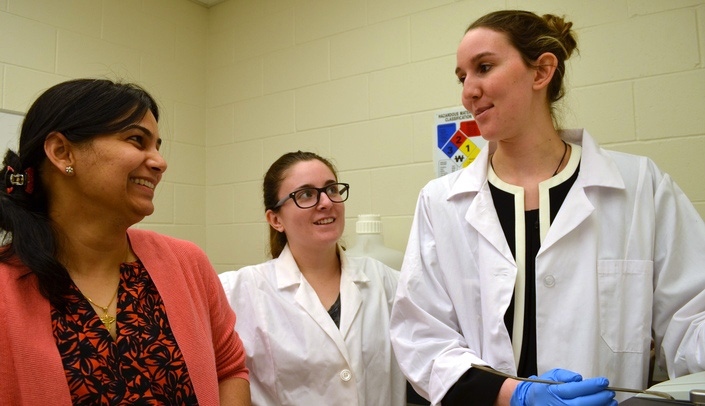When Dunesh Kumari took a medicated syrup as a child to help relieve an ache or pain, she didn’t wonder how long it would be before she felt better, instead she wanted to know what was in it.
For her the medication was like a magical potion and she wanted to be the magician who made those potions and relieved the aches and pains of those around her.
"Growing up I wanted to know what the ingredients were and what the active process was that allowed it to help alleviate whatever ailment it was being used for," said Dr. Kumari, an assistant professor of analytical chemistry at the College of Saint Mary in Omaha, Neb., and one of the newest recipients of an INBRE Developmental Research Project Program grant.
"I was very curious, always asking questions and I loved learning all the new developments in science," she said.
Having the opportunity to take part in the INBRE program, Dr. Kumari said, is really exciting.
The DRPP funding will allow her to focus on doing more translational biomedical research in the lab during the summer, help her get needed supplies and hopefully some new instrumentation.
Dr. Kumari obtained her doctoral degree in analytical chemistry from Northeastern University in Boston, Mass., before moving to Omaha seven years ago with her husband, Harsh Chauhan, Ph.D., an associate professor of pharmaceutical sciences at Creighton University. Together they have two children, Dhairesh, 5, and Parih, 6.
At the College of Saint Mary, Dr. Kumari teaches biochemistry and chemistry, as well as labs in analytical chemistry, instrumental analysis and general chemistry.
Her research focus is on poorly soluble antioxidants and the role they play in prevention and treatment of various diseases, as well as how the body metabolizes them. She is particularly interested in designing a way to combine various phytochemicals, such as curcumin, resveratrol, piperine and quercetin, with biodegradable matrixes to better leverage their potent anti-oxidant activity.
"Our long-term goal is to understand molecular interactions between molecules and a biodegradable matrix, then design suitable delivery systems utilizing these interactions and harness their pharmacological benefits," Dr. Kumari said.
She is sharing her research with four undergraduate students who are working on projects in her lab, two of whom are INBRE scholars.
All four reap the benefits of the INBRE program, by virtue of the support Dr. Kumari receives, said Paul Sorgen, Ph.D., director of the program.
"We are excited to have Dr. Kumari and her students participate in the NE-INBRE program and we hope this will spark an interest in biomedical research in these students," Dr. Sorgen said.
